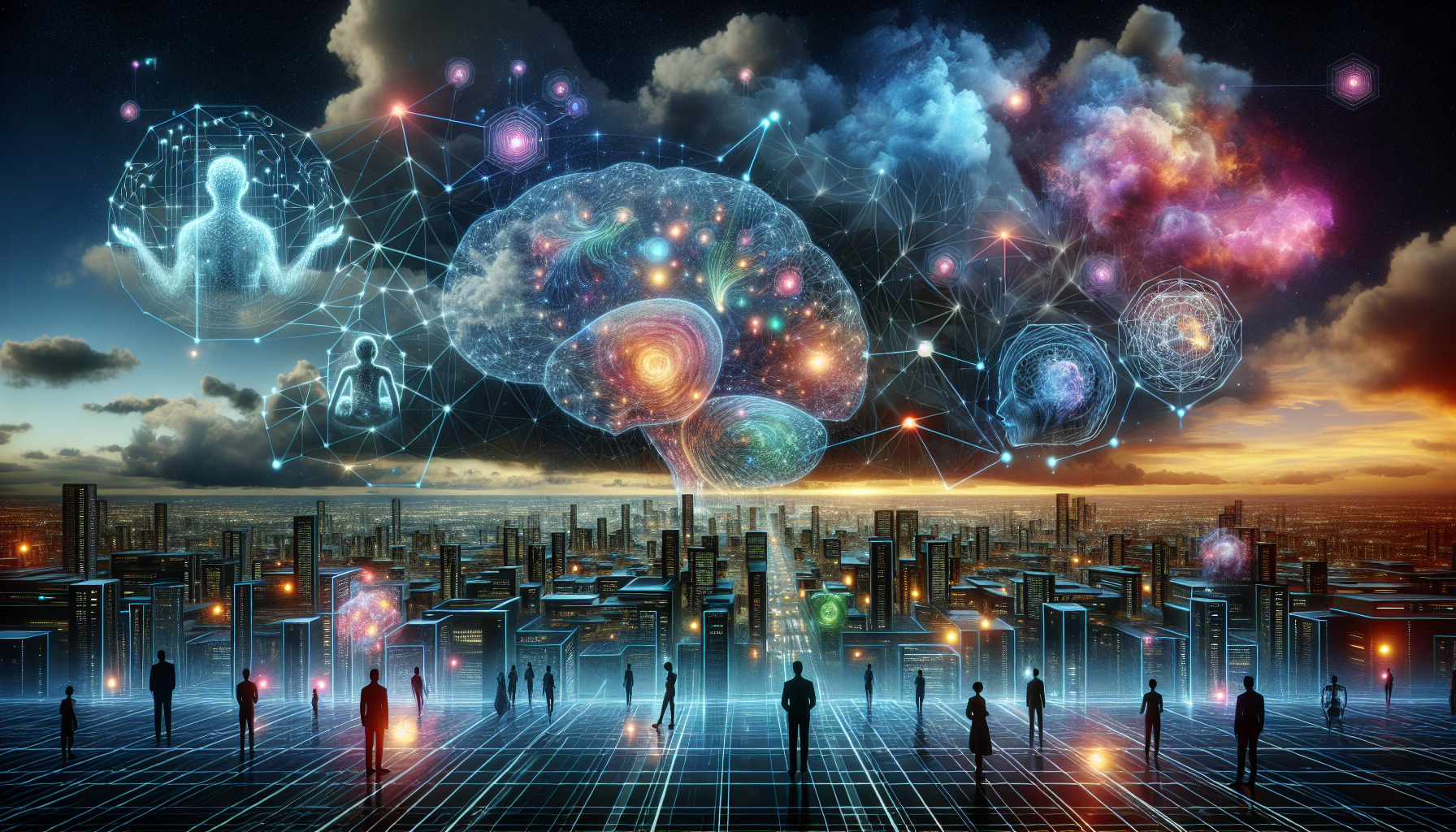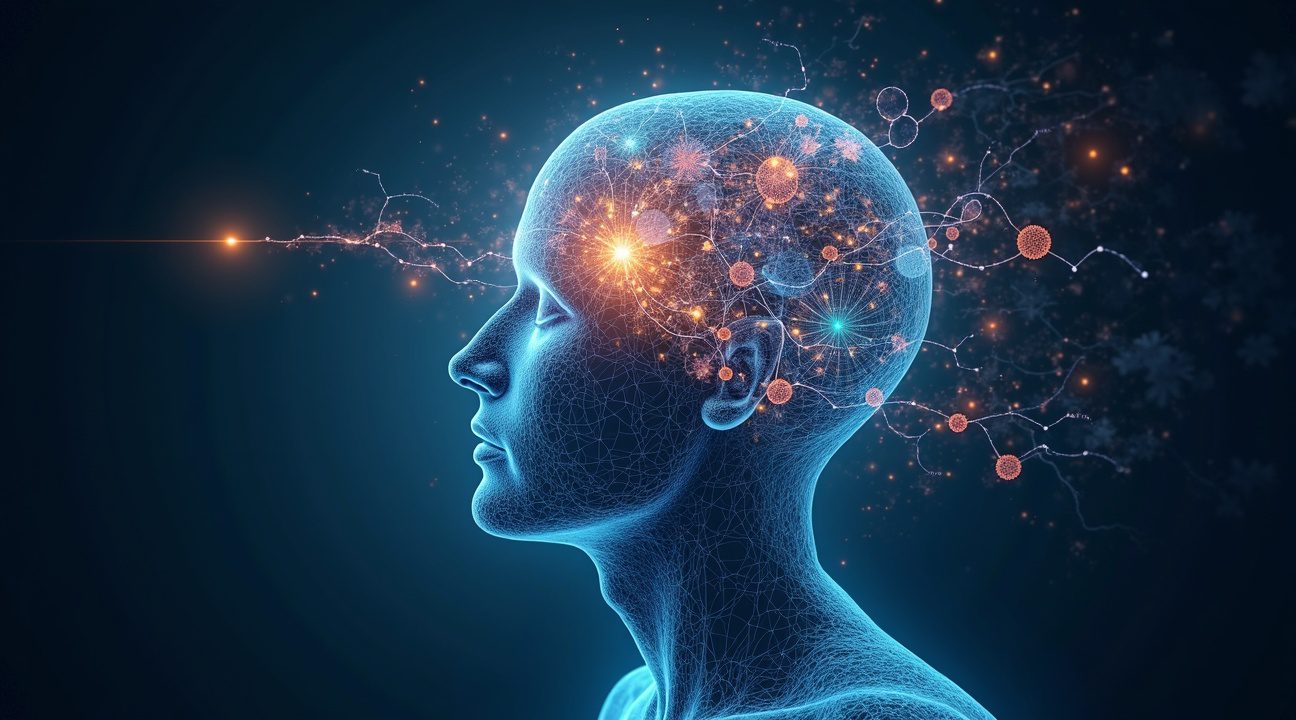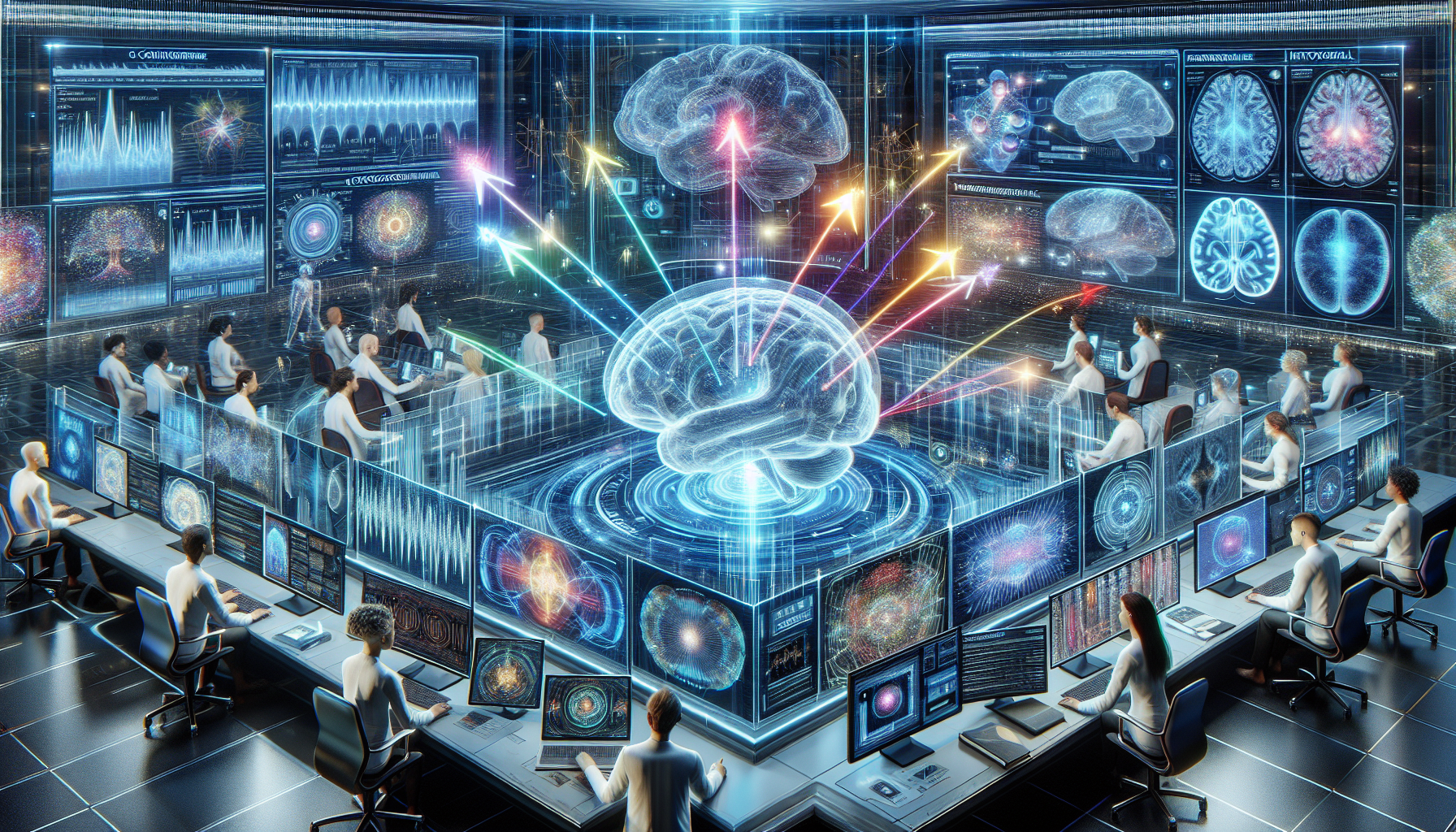Cognosphere Pte. Ltd. serves as the parent company behind HoYoverse, a gaming enterprise that has transformed how digital platforms create shared experiences across global audiences.
The company’s strategic positioning illustrates how modern gaming organizations can build interconnected networks that span multiple continents, enabling collective digital consciousness through innovative technology and diverse cultural approaches.
Key Takeaways
- Global Network Creation: HoYoverse operates studios across Singapore, Montreal, Los Angeles, Tokyo, and Seoul to develop culturally diverse gaming experiences that engage millions of players in shared digital environments.
- Technology-Driven Enhancement: The company invests significantly in artificial intelligence, cloud computing, and metaverse infrastructure to enhance collective digital experiences and reshape how players interact with and process information.
- Massive-Scale Digital Consciousness: The success of Genshin Impact showcases how gaming platforms can create shared narratives and experiences among more than 63 million players, fostering collaborative knowledge networks that extend beyond traditional entertainment.
- Cross-Cultural Integration: HoYoverse’s localization strategies promote authentic representation, crafting virtual environments that build meaningful cross-cultural relationships among global user bases.
- Collaborative Knowledge Systems: Players become part of evolving digital ecosystems where they coordinate strategies, exchange discoveries, and develop user-generated content that contributes to shared understanding and collaborative problem-solving.
HoYoverse: When Gaming Giants Reshape Global Digital Consciousness
Cognosphere Pte. Ltd. operates under the HoYoverse brand, transforming how millions experience shared digital realities. The company stands as a testament to how modern gaming enterprises can reshape global consciousness through innovative publishing strategies and technological investments.
Strategic Global Expansion and Technology Integration
HoYoverse’s strategic positioning across multiple continents demonstrates a sophisticated understanding of global digital culture. With major studios spanning Singapore, Montreal, Los Angeles, Tokyo, and Seoul, the company creates a truly international development ecosystem. This geographic distribution enables culturally diverse input while maintaining cohesive gaming experiences that resonate across different markets.
In 2022, HoYoverse announced significant investments in emerging technologies that promise to redefine interactive entertainment. These strategic investments focus on artificial intelligence, cloud computing, and metaverse infrastructure—technologies that enhance collective digital experiences. Such forward-thinking approaches position the company at the forefront of technological innovation in gaming.
Facilitating Massive Collective Engagement
Genshin Impact serves as HoYoverse’s flagship demonstration of large-scale digital consciousness creation. With over 63 million active players in 2023, the game exemplifies how modern platforms can facilitate shared cognitive experiences across vast global audiences. Players don’t simply consume content; they participate in an evolving digital ecosystem that connects diverse communities through common virtual experiences.
The success of Genshin Impact illustrates how gaming platforms extend traditional boundaries of entertainment into something more profound—a space where collective digital cognition emerges naturally. Players coordinate strategies, share discoveries, and create content that enhances everyone’s experience, effectively building a collaborative knowledge network.
HoYoverse’s approach to global publishing outside China demonstrates how technology companies can bridge cultural divides through immersive digital experiences. The company’s commitment to localization ensures that players from different regions feel authentically represented while participating in shared virtual worlds.
Through strategic investments in gaming technology and maintaining studios across multiple continents, HoYoverse continues to push boundaries in creating globally connected digital experiences. Their success proves that companies can build meaningful connections between diverse populations through carefully crafted virtual environments that encourage collaboration and shared exploration.

The Revolutionary Framework That Defined Digital-Age Thinking
I’ve witnessed firsthand how digital transformation has reshaped not just our tools, but our very consciousness. The cognosphere represents a groundbreaking concept that captures the totality of information processed through the cognitive activities of living beings. This revolutionary framework emerged as part of the Digital Era Framework, offering a comprehensive lens through which we can understand our evolving relationship with information in the digital age.
The cognosphere encompasses every aspect of our cognitive reality. It includes thoughts, knowledge, attitudes, beliefs, expectations, and intention-based processes that define how we interact with digital systems. Unlike traditional information models, this framework recognizes that artificial intelligence and digital technologies don’t just process data—they fundamentally alter how we think, learn, and perceive reality.
Distinguishing the Cognosphere from Related Concepts
Understanding the cognosphere requires distinguishing it from two related but distinct domains. The infosphere pertains specifically to computational or analytical information systems—the technical infrastructure that processes data. Meanwhile, the entisphere centers on intentionality-driven processes, focusing on the purposeful actions that emerge from conscious decision-making.
The cognosphere sits at the intersection of these domains, serving as the bridge between human cognition and digital systems. It delineates the mental and cognitive functions that shape our interaction with technology. This distinction becomes crucial when examining how humans relationship with tech continues to evolve.
Core Components of Cognitive Reality
The framework identifies several key elements that constitute our cognitive reality in the digital age:
- Captured information flows through our sensory experiences with digital interfaces
- Stored knowledge that accumulates through repeated digital interactions
- Processed understanding that emerges from cognitive engagement with technology
- Belief systems that develop around digital capabilities and limitations
- Expectation patterns that guide our anticipation of technological outcomes
- Intention-based processes that drive our purposeful use of digital tools
This cognitive model reveals how data mining in gaming and other digital activities shape our mental frameworks. Each interaction with digital systems contributes to an expanding cognosphere that influences how we process information and make decisions.
The Digital Era Framework positions the cognosphere as central to understanding information society evolution. As digitalization accelerates, the boundaries between human cognition and digital processing become increasingly blurred. This convergence creates new forms of hybrid thinking where biological and artificial intelligence collaborate in unprecedented ways.
The cognosphere also helps explain why video games impact individuals so profoundly. These digital environments don’t just entertain—they actively reshape cognitive patterns, problem-solving approaches, and social interaction models. The framework provides tools for analyzing these transformations systematically.
Digital transformation through the cognosphere lens reveals patterns invisible to traditional analysis methods. For instance, the rise of conversational AI like Google Bard demonstrates how cognitive interfaces reshape human communication patterns and thought processes.
The cognosphere concept proves particularly valuable for understanding how digital environments influence cognitive development. As individuals engage with increasingly sophisticated digital systems, their cognitive architectures adapt and evolve. This adaptation process creates feedback loops that continuously modify both individual and collective cognitive capabilities.
Research applications of the cognosphere framework extend across multiple disciplines. Cognitive scientists use it to study human-computer interaction patterns. Educators apply it to understand how digital learning environments affect knowledge acquisition. Business leaders leverage it to design more intuitive digital products and services.
The framework also illuminates how gaming innovations contribute to cognitive evolution. Complex game mechanics create cognitive challenges that expand problem-solving capabilities and strategic thinking skills.
As digital technologies continue advancing, the cognosphere framework provides essential tools for understanding their cognitive implications. It offers a structured approach to analyzing how emerging technologies will reshape human thinking patterns and social interactions. This understanding becomes increasingly critical as we design digital futures that enhance rather than diminish human cognitive potential.

How the Cognosphere Differs from Every Other Information Domain
The cognosphere represents a unique information domain that encompasses how cognitive agents process and store knowledge through mental mechanisms. I position this concept alongside established sphere frameworks such as the geosphere, atmosphere, biosphere, and lithosphere, yet it maintains distinct characteristics that set it apart from purely physical or digital domains.
Distinguishing Features from Traditional Information Spheres
The most significant distinction lies in how the cognosphere differs from the infosphere, which primarily focuses on external information repositories and automated systems. While the infosphere encompasses digital storage solutions, cloud databases, and computerized record-keeping systems, the cognosphere centers on intrinsic mental processes that occur within conscious agents. This fundamental difference shapes how information flows, transforms, and persists within each domain.
I observe several key differentiating factors that establish the cognosphere’s unique position:
- Mental processing capabilities that transform raw data into meaningful knowledge through cognitive interpretation
- Integration of both analog and digital information processing methods within biological and artificial cognitive systems
- Active knowledge creation through synthesis, reasoning, and creative thought processes
- Dynamic memory formation that includes selective retention, modification, and reconstruction of information
- Emotional and contextual associations that influence how information is stored and retrieved
The cognosphere incorporates human memory systems, where artificial intelligence also plays an increasingly important role in cognitive processing. Unlike static digital repositories, cognitive agents actively interpret, synthesize, and reconstruct information based on prior experiences and contextual factors. This creates a living information ecosystem where knowledge continuously evolves through mental interaction.
Another critical distinction emerges when comparing the cognosphere to the entisphere, which encompasses all existing entities and their relationships. The cognosphere specifically focuses on how these entities are perceived, understood, and mentally represented by cognitive agents. It’s not merely about what exists, but how consciousness interprets and processes that existence into meaningful information.
The digital era has blurred some boundaries between the cognosphere and infosphere, particularly as humans relationship with tech becomes more integrated. However, the cognosphere maintains its emphasis on conscious processing rather than automated data handling. When someone reads information from a digital device, the cognosphere encompasses the mental transformation of that data into personal understanding, while the infosphere represents the technological infrastructure storing and transmitting the raw information.
Physical sphere concepts like the geosphere and atmosphere operate according to predictable natural laws, whereas the cognosphere functions through cognitive science principles that include subjective interpretation, creative synthesis, and individual variation in processing capabilities. This subjectivity creates infinite possibilities for how identical information can be understood, remembered, and applied by different cognitive agents.
The cognosphere also differs in its temporal characteristics. While digital storage systems maintain static information until deliberately modified, cognitive storage involves continuous reconstruction and reinterpretation. Each time someone recalls a memory or applies learned knowledge, they potentially alter that information through the lens of new experiences and understanding.
Information processing within the cognosphere extends beyond simple storage and retrieval. Cognitive agents engage in complex operations like pattern recognition, analogical reasoning, and creative problem-solving that generate new knowledge from existing information. These processes distinguish the cognosphere from mechanical information systems that can only manipulate data according to predetermined algorithms.
The integration of analog and digital processing within the cognosphere reflects how modern cognitive agents operate across multiple information channels simultaneously. Video games having a positive impact demonstrates this integration, where digital environments influence cognitive development and knowledge formation. The cognosphere encompasses both the technological interaction and the mental processing that transforms gaming experiences into lasting cognitive changes.
Understanding these distinctions helps clarify how the cognosphere functions as a unique information domain where consciousness actively shapes, interprets, and creates knowledge rather than simply storing or transmitting data. This cognitive-centered approach distinguishes it from all other information spheres while highlighting its crucial role in how knowledge exists and evolves within conscious systems.

The Technical Language Revolutionizing Cognitive Science Research
Cognitive science researchers have developed a sophisticated vocabulary to describe phenomena within and around the cognosphere. These technical descriptors provide precision when categorizing different types of cognitive processes and their boundaries.
The foundational term ‘cognispheral’ describes anything that belongs to or originates from the cognosphere itself. Scientists use this descriptor when examining processes that are inherently part of cognitive activity. Building on this foundation, researchers employ more specific terminology to pinpoint exact locations and movements of cognitive phenomena.
‘Intracognispheral’ and ‘endocognispheral’ both describe processes that occur entirely within cognitive boundaries. I find these terms particularly useful when studying internal mental operations like memory consolidation or creative synthesis. Artificial intelligence research frequently references these concepts when modeling human cognitive processes.
Conversely, ‘extracognispheral’ and ‘exokognispheral’ designate phenomena that exist completely outside cognitive boundaries. These terms help researchers identify external factors that might influence cognitive function without being part of the cognitive process itself.
Directional Movement Classifications
Movement-based classifications add another layer of precision to cognitive research terminology:
- ‘Extrocognispheral’ processes begin within the cognosphere but extend outward, such as when thoughts translate into physical actions
- ‘Introcognispheral’ processes start outside cognitive boundaries but enter the cognosphere, like sensory input becoming conscious perception
- ‘Transcognispheral’ actions occur when both the origin and destination lie outside cognitive boundaries, bypassing direct cognitive involvement
These directional descriptors prove essential when studying human-technology interactions and how external stimuli affect cognitive states. Interdisciplinary researchers particularly value this vocabulary because it creates consistent communication standards across different fields.
Academic writing increasingly incorporates these terms as cognitive science expands into new territories. Data analysis techniques now recognize these classifications when processing cognitive research datasets. The precision offered by this technical language helps avoid ambiguity in research publications and enables more accurate peer review processes.
Contemporary studies examining cognitive development through digital interactions rely heavily on these descriptors. Researchers can now specify whether observed changes occur within cognitive boundaries or result from external influences, leading to more targeted therapeutic interventions and educational strategies.

Why AI Ethics and Digital Privacy Will Never Be the Same
The emergence of the cognosphere fundamentally alters how I view AI ethics and digital privacy. Traditional frameworks that separate human cognition from technological systems no longer capture the reality of our interconnected cognitive landscape. Artificial intelligence systems don’t just process data—they actively participate in shaping human thought processes, decision-making, and knowledge creation.
This cognitive integration creates unprecedented ethical challenges. When AI systems become extensions of human cognitive processes, determining where human agency ends and algorithmic influence begins becomes increasingly complex. The cognosphere reveals that digital platforms aren’t merely tools but active participants in cognitive tasks, fundamentally changing how I understand user privacy and autonomy.
Cognitive Augmentation and Privacy Boundaries
Digital platforms now access and influence cognitive processes in ways that traditional privacy models can’t adequately address. Consider how recommendation algorithms shape what information enters someone’s cognitive space, effectively becoming part of their thinking process. This represents a shift from protecting static personal data to safeguarding dynamic cognitive processes.
The following areas require new ethical frameworks:
- Cognitive data collection that captures thinking patterns and decision-making processes
- Algorithmic influence on memory formation and knowledge retention
- Digital manipulation of attention and focus mechanisms
- Artificial enhancement of cognitive capabilities through brain-computer interfaces
Human relationships with technology evolve as cognitive boundaries blur. Traditional consent models become insufficient when AI systems continuously adapt to and modify cognitive patterns. Users can’t meaningfully consent to processes they don’t understand or cognitive changes they can’t anticipate.
Knowledge management systems within the cognosphere raise additional concerns about intellectual property and cognitive ownership. When AI systems participate in knowledge creation, determining authorship and protecting cognitive contributions becomes increasingly challenging. Data mining techniques extract cognitive patterns that reveal intimate details about thinking processes, creating new categories of sensitive information.
Digital well-being takes on new dimensions within this framework. Cognitive augmentation technologies can enhance human capabilities but also create dependencies that affect mental health and cognitive autonomy. The cognosphere demands ethical guidelines that balance cognitive enhancement benefits with preservation of human agency and cognitive diversity.
These developments require regulatory approaches that address cognitive rights, algorithmic transparency in cognitive processes, and protection of cognitive diversity. The cognosphere framework enables policymakers and technologists to evaluate the societal implications of cognitive augmentation before widespread implementation, ensuring that technological advancement serves human flourishing rather than undermining cognitive autonomy.
The Global Impact on How We Process and Share Knowledge
Digital platforms have fundamentally transformed how I experience the exchange of ideas and information across global boundaries. These interconnected systems create shared virtual environments where millions of participants engage in collective cognitive processes that span continents and cultures. International tech companies have structured their operations to support this phenomenon, building infrastructure that enables cross-cultural interactions and knowledge sharing on an unprecedented scale.
The globalized cognisphere represents more than just individual thinking processes—it embodies a form of shared digital consciousness that emerges from our collective interactions online. When I participate in online discussions, contribute to collaborative projects, or share knowledge through digital platforms, I become part of a larger cognitive network that transcends physical limitations. This network demonstrates how artificial intelligence and human cognition increasingly work together to process and distribute information.
Reshaping Information Processing in the Digital Age
The information society continues to evolve as digital transformation reshapes how we process beliefs, knowledge, and attitudes. This evolution manifests in several key ways:
- Real-time knowledge validation through crowd-sourced verification systems
- Cross-cultural perspective integration that challenges traditional knowledge boundaries
- Emergent collective intelligence patterns that arise from large-scale collaboration
- Dynamic belief system adaptation based on global information flows
These changes reflect a fundamental shift from isolated cognitive processes to interconnected forms of collective cognition. The relationship between humans and technology has become so intertwined that distinguishing between individual and collective thinking becomes increasingly difficult. Digital platforms now serve as extensions of our cognitive capabilities, allowing us to access, process, and contribute to a global knowledge base in real-time.
The emergence of this interconnected cognitive landscape has profound implications for how societies develop and maintain shared understanding. Data mining and algorithmic processing help identify patterns in collective knowledge creation, while interactive digital environments provide spaces for experiential learning and knowledge application.
This global cognitive network continues to expand as more individuals gain access to digital platforms and contribute their unique perspectives to the collective knowledge pool. The result is an increasingly sophisticated system of distributed cognition that challenges traditional models of how knowledge is created, validated, and shared across human societies.
Sources:
Dr. Dr. Jörn Lengsfeld, “Cognisphere – Dr. Dr. Jörn Lengsfeld”
“COGNOSPHERE PTE. LTD. Privacy Policy,” HoYoverse documentation
Federal Trade Commission, “Proposed Stipulated Order for Permanent Injunction, Civil Penalty, and Other Relief, Cognosphere, LLC and Cognosphere Pte. Ltd”
Wikipedia, “MiHoYo”
YouTube, “Cognosphere The New Publisher For Genshin Impact”


